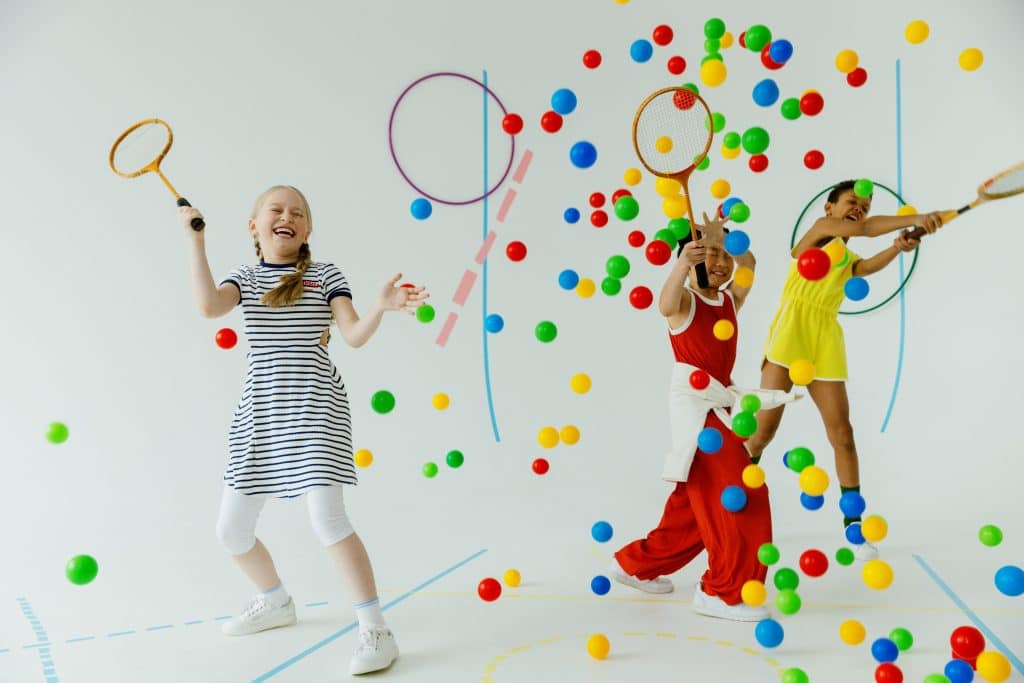Executive functioning skills are crucial as kids grow up, helping them manage emotions, stay organized, and succeed socially and academically. These skills develop over time, but the timeline can look different for kids with special needs.
Key Takeaways:
- Executive functioning skills develop at different stages: Emotional control, working memory, and cognitive flexibility emerge early.
- Kids with special needs may follow different timelines: Support and patience are crucial for helping them build these skills.
- Tools like visual schedules and checklists can help: Kids with ADHD or executive function challenges benefit from structured support.
What is executive functioning ? These are the cognitive abilities and self-regulation skills that develop as children grow. They help kids manage emotions, focus attention, solve problems, and regulate behaviors. These skills evolve at different stages as kids develop.
Table of Contents
What Are Executive Function Skills?
As parents, it’s important to understand how executive function skills develop as our children grow. These skills are essential for self-regulation, which involves managing behavior and emotions, knowing what to focus on, and what to ignore. It’s natural for us to be more patient with a toddler having a tantrum in a new environment compared to a six-year-old doing the same thing. We rely on developmental norms to anticipate certain behaviors from our children. However, children with special needs may experience challenges with self-regulation due to delays in the development of these skills. At Goally, we recognize the significance of executive function skills by age and offer valuable support to parents navigating this journey with their children. While all of our executive functions work together, we can break them down into nine specific skills.
Those skills include:
- Organization
- Planning
- Task Monitoring
- Working Memory
- Initiation
- Self Monitoring
- Cognitive Flexibility
- Initiation
- Emotional Control
- Inhibition
As special needs parents already know, there is no road map for neurodivergence. Your child might be strong in one area and struggle in another. Even so, you can teach and foster all of these skills to make life easier for your child as they grow.

Read more: Executive Function Test for Kids
Understanding Executive Function Skills by Age
Just like we expect children to walk or talk around certain ages, we expect executive function skills to develop on a timeline. For neurodiverse children, this timeline might look a little different. This is what skill development might look like in a typically developing child.
Babies (Six to 12 months)
Between six and 12 months, you can expect to see your child working on emotional control, working memory, and attention. What does this look like?
Your baby is working on emotional control as they develop the ability to self-soothe. At this stage, they may still need some support from a caregiver, especially at bedtime. You can see working memory develop as your baby begins recognizing the people in their lives. You might also notice that they are starting to show preferences for foods, activities, or places!
Toddlers (One To Two Years)
Between one and two years of age, your little one will be developing cognitive flexibility and inhibition skills as they begin playing and interacting with the world around them!
- Cognitive flexibility is the ability to problem-solve. You’ll notice that a lot of the toys geared toward this age group encourage flexible thinking. This is why toddlerhood is full of escape attempts and derring-do!
- Inhibition is a child’s ability to resist doing a desired behavior under certain conditions. While toddlers are incredibly impulsive and express discontentment loudly, it’s because they are grappling with these new skills. Watch how their behavior changes as they develop an understanding of behavioral expectations.
Preschoolers (Three To Five years)
Preschool is a major period of social development. During this stage, your child will be actively building skills involving emotional control, cognitive flexibility, self-monitoring, organization, and inhibition.
Preschool is when children begin to manage their own care and materials in earnest, from washing hands to cleaning up after play. They will begin to notice and respond to others’ emotions and may begin to anticipate certain responses. They also begin to learn the value of language for persuading parents and peers, compromising, and expressing clear points of view.

Read More: ADHD and Executive Function
Elementary Schoolers (Six To 12 Years)
By the time a child reaches elementary school, they begin developing the executive functions they need to engage with their schoolwork. You will notice improvements in working memory, planning, organization, initiation, emotional control, and inhibition.
This is when children begin to retain and use new learning. Children will also begin to manage both their time and materials as they complete projects and assignments. They must use their initiation skills to begin tasks, especially if they aren’t intrinsically motivating, like homework.
Beyond Elementary School
Remember that children are constantly developing! Skills like task monitoring (checking work as you go) usually don’t emerge until middle or high school. Even a child with perfectly typical development isn’t finished picking up and refining their executive function skills until the age of 25 – and they may have completed graduate school by then!
| Age Group | Executive Function Skills |
|---|---|
| Babies (Six to 12 months) | Emotional control: developing self-soothing abilities Working memory: recognizing familiar people and showing preferences Attention: focusing on people, sounds, and objects |
| Toddlers (One to Two Years) | Cognitive flexibility: problem-solving and flexible thinking Inhibition: resisting undesired behaviors under specific conditions |
| Preschoolers (Three to Five Years) | Emotional control: managing emotions and responding to others Cognitive flexibility: building mental models and completing tasks Self-monitoring: taking care of oneself and materials Organization: learning to clean up and manage belongings Inhibition: developing an understanding of behavioral expectations |
| Elementary Schoolers (Six to 12 Years) | Working memory: retaining and using new learning Planning: managing time and materials for projects and assignments Initiation: starting tasks, even if not intrinsically motivating Emotional control: managing emotions in social interactions Inhibition: adapting to changes in plans or routines |
| Beyond Elementary School | Task monitoring: checking work as you go (usually emerges later) Continued development: refining executive function skills until around age 25 Support and patience: unique timelines for children with ADHD or executive function struggles |
Possible Causes of Executive Function Challenges
Research has identified two main factors causing trouble with executive function and ADHD:
- Differences in brain development: Certain brain areas develop more slowly in people who struggle with executive skills, affecting working memory and emotional control.
- Genes and heredity: People with executive function difficulties often have family members with similar issues.
Trouble with executive function often coexists with learning challenges. Learning disabilities don’t always involve executive function problems, but it’s not uncommon. Slow processing speed isn’t a direct issue with executive function but can still affect it.
Diagnosing and Treating Executive Function Challenges
There’s no diagnosis called executive function disorder, but tests can evaluate a wide range of executive skills, including:
- Attention
- Inhibitory control
- Working memory
- Organization and planning
- Concept formation
- Set shifting (ability to shift from one task to another)
- Word and idea generation
Testing should be part of a full evaluation of learning and thinking, often done by psychologists. Schools offer free evaluations for kids, but other professionals can also conduct this testing.
Some treatments and approaches include:
- Behavior therapy and cognitive behavioral therapy (CBT): Behavior therapy helps replace negative behaviors with positive ones. CBT helps manage thoughts, feelings, and behaviors.
- Medications: While no medications specifically target executive function, there are medications for ADHD.
- School services for kids: School psychologists and special education teachers can help with social skills, behavior management, academic skills, and organization.
- Organizational coaching: Consultants help build organization and time management skills, not academic skills. They also work on study skills with kids.
Goally | Apps To Structure Your Kid’s Routine
Does your child struggle with transitions or staying on task? Goally’s visual schedule app breaks down large tasks into small, achievable steps. It helps kids complete their tasks independently!
Reaching Development Milestones With Goally
Based on our list of executive function skills by age, you might just now be recognizing that your child could use some extra support. Luckily, tools like checklists, visual schedules, and social stories make it easier for neurodivergent children to thrive. With the right tools, many children make incredible progress and achieve wonderful things every day – without nagging from mom and dad!While laminated charts serve a purpose, the Goally device and suite of apps make it even easier to help your child reach their developmental goals. Each app is fully customizable and includes built-in reminders and rewards systems that make everyone’s life easier!
FAQ’s About Executive Function Skills by Age
What are executive function skills by age? Executive function skills by age refer to the cognitive abilities and self-regulation skills that develop as children grow, impacting their problem-solving, attention, and emotional control. How do executive function skills develop in babies? Babies develop executive function skills through milestones like emotional control, working memory, and attention, which involve self-soothing, recognizing familiar faces, and focused attention. What executive function skills do toddlers develop? Toddlers develop executive function skills like cognitive flexibility and inhibition, which enable them to problem-solve and resist impulsive behaviors under specific conditions. What executive function skills are important for preschoolers? Preschoolers focus on developing emotional control, cognitive flexibility, self-monitoring, organization, and inhibition to manage their emotions, build mental models, and take care of themselves and their belongings. How do executive function skills develop in elementary schoolers? In elementary school, children enhance their executive function skills such as working memory, planning, organization, initiation, emotional control, and inhibition, vital for academic engagement, social interactions, and managing tasks effectively.
This post was originally published on 03/01/2023. It was updated on 09/20/2024.
Emily is a seasoned blog writer for Goally, leveraging her extensive background in child psychology and special education to provide valuable insights and resources for parents. Her commitment to understanding and addressing the unique needs of these children, combined with her expertise in educational strategies, makes her a credible and empathetic voice for families.






